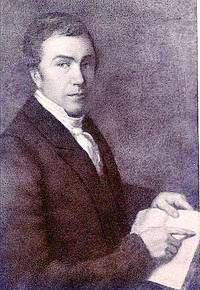Apostle to the Native Americans
During the month of December, Kentucky Baptists not only think about Christmas — but also about missions. Every year Kentucky Baptists receive the Lottie Moon Christmas Offering for foreign missions. Lottie Moon — well known for her service in China — along with William Carey, Adoniram Judson and George Liele, are some of the most famous Baptist missionaries. Often forgotten from the list is Isaac McCoy, the “Apostle of the Great Plains,” a Baptist missionary to Native Americans.

Ben Stratton
Isaac McCoy was born in Pennsylvania in 1784, but his family migrated to Kentucky when he was only five years old. His father, William McCoy, became the pastor of the Buck Creek Baptist Church in Shelby County. Isaac was saved and baptized into the fellowship of the Buck Creek congregation in 1801.
Although Isaac had become a pastor in 1810, it was his service in the War of 1812 that opened his eyes to the great spiritual needs of Native Americans. In 1817, after sharing this burden, he was appointed a missionary by the old Triennial Baptist Convention, the forerunner of the Southern Baptist Convention. After his appointment, McCoy traveled throughout Kentucky gathering support. After speaking to the Little River Baptist Association in 1818, the body organized an Indian Missions Society.
McCoy immediately went to work. He established a mission to the Wea tribe at Armiesburg, Indiana, a mission for the Miami tribe in Fort Wayne, Indiana, the “Carey Mission” (named after William Carey) to the Potawatomi tribe in Niles, Michigan, a mission to the Ottawa tribe in Grand Rapids, Michigan, and finally a mission to the Shawnee tribe in Johnson County, Kansas.

Isaac McCoy at age 47
The difficulties McCoy faced were enormous. There were vast stretches of rugged wilderness. He was bitterly opposed by Primitive Baptists such as Daniel Parker as well as Catholic Jesuit missionaries. Although disease claimed the lives of five of his nine children, McCoy was always faithful to his task.
Due to the prejudice of most Americans and the abundant availability of destructive alcohol, McCoy came to believe the best thing for the Native Americans was a state of their own west of the Mississippi River and far away from white settlements. With the permission of Congress, he mapped out the land that became the Indian Territory. In 1832 he helped John Davis, a Creek Indian preacher, establish the Muscogee Baptist Church in Ebenezer Station. This was the first Baptist church in what eventually became the state of Oklahoma.
In 1842, McCoy moved back to his beloved Kentucky. The Baptist American Indian Mission Association was organized in Louisville with McCoy serving as director. In addition to this work, he regularly attended Baptist meetings. He was the oldest minister present at the 1842 annual meeting of Kentucky Baptists and the lone messenger from Kentucky present when the Southern Baptist Convention was formed in Augusta, Georgia, in 1845.
It is no wonder that at the 1843 annual meeting of the General Association of Kentucky Baptists, the messengers adopted a resolution recognizing Isaac McCoy as “one of the most zealous and devoted philanthropists that have lived and died in Kentucky. This self-sacrificing Christian minister and devoted missionary deserves to be held in everlasting remembrance, especially by all the friends of the American Indian.”
McCoy died in 1846. He is buried in an unmarked grave in the Western Cemetery in Louisville, Kentucky. After years of struggle, he now rests from his labors and heaven alone knows the souls that followed him to glory (Revelation 14:13).
Ben Stratton is pastor of Farmington Baptist Church in Graves County and a Baptist historian with the J.H. Spencer Historical Society.
Ben Stratton